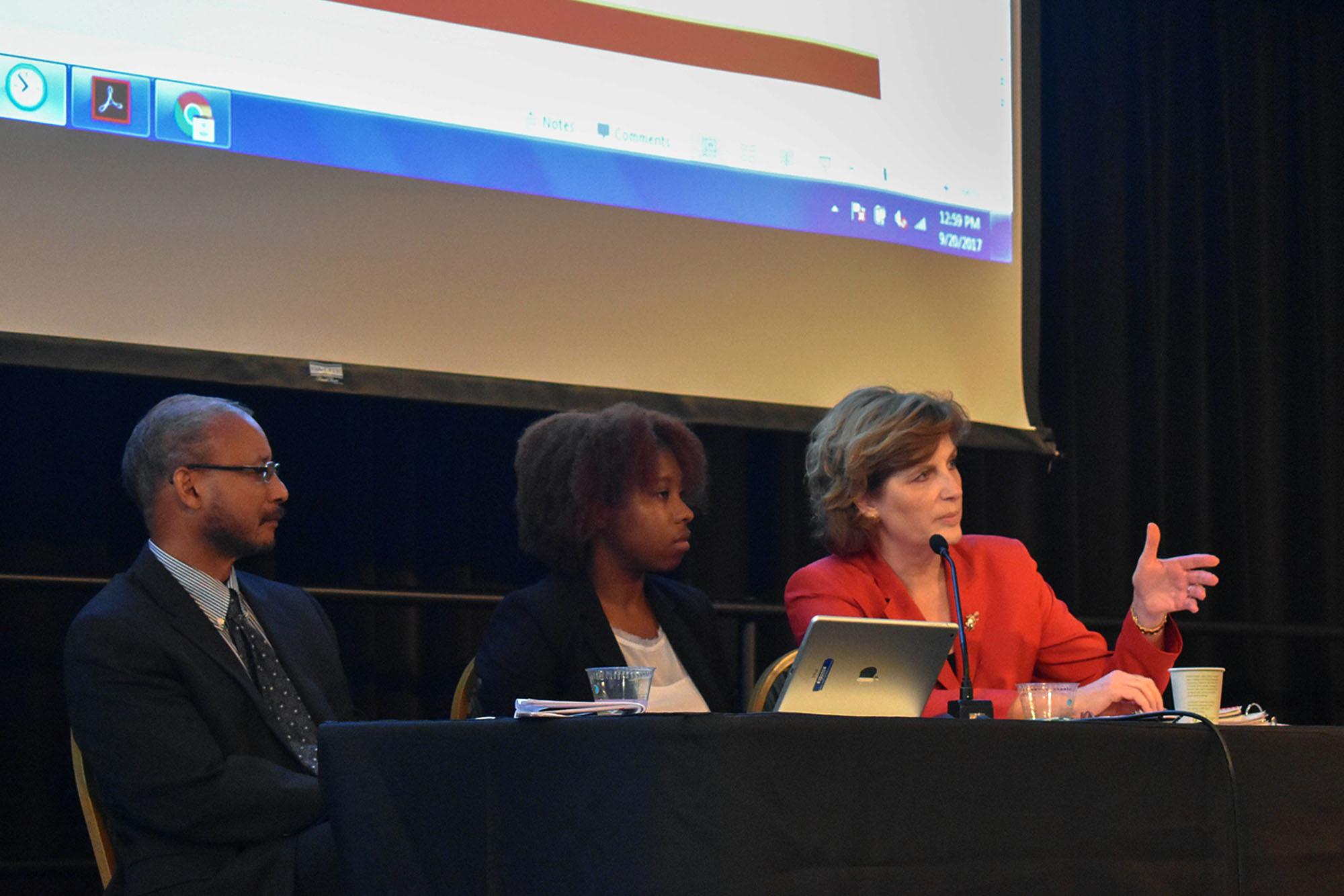At the first open forum for the University of Maryland Senate’s diversity task force Wednesday, some students and faculty expressed concerns about its potential impact.
“What I want to know is how you’re going to make sure this stuff materializes into actual change,” senior Sarah Eshera said at the forum.
The math and philosophy major is a member of ProtectUMD, a coalition that issued 64 demands to this university’s administration last year to help marginalized student communities.
“We have a list of 64 suggestions of what to do, including increasing minimum wage — that’s clear stuff that you’re able to change,” Eshera said. “I want to know why it hasn’t been worked on by the administration side, but only on the student side.”
In response, task force co-chair Ja’Nya Banks said the University Senate has the power to implement those changes, and the task force will reach out to individual student groups to help garner support.
[Read more: UMD President Loh announces action plan to “combat hate and create a safer campus” ]
The forum for the task force, officially called the President and University Senate’s Joint Task Force on Inclusion and Respect, was held from noon to 2 p.m. at Stamp Student Union. It aimed to discuss the task force’s goals and engage the campus community, said Warren Kelley, assistant student affairs vice president.
Kelley co-chairs the 18-member task force alongside Lucy Dalglish, journalism college dean, and Banks, a senior special education major and the Student Government Association’s diversity and inclusion director.
“We are living in challenging times,” Dalglish said as she welcomed nearly 60 students and faculty members. “We need your observations and suggestions.”
University President Wallace Loh and University Senate Chair Daniel Falvey created the task force after the death of black Bowie State University student Richard Collins on this university’s campus. Sean Urbanski, a white former student of this university, has been indicted on murder charges. The incident is under investigation as a potential hate crime.
Collins’ death came at the end of a school year that included a noose being found in a fraternity chapter house, multiple discoveries of white nationalist posters on the campus and anti-immigrant chalkings on display in front of Stamp.
The task force created five working groups: free speech and hate speech, policies and procedures, prevention and education, climate and hate bias response. These subcommittees will produce preliminary recommendations to the task force as a whole.
The subcommittees are the task force’s first steps in fulfilling Loh and the Senate Executive Committee’s request for the group to “consider how best to nurture a climate that is respectful and inclusive of all members of our campus community, stands against hate, and reaffirms the values that define us as a University,” according to the task force’s charge.
The task force must submit its final recommendation by March 30. The University Senate will review the recommendation in April.
Bill Kules, a visiting professor in the information studies college, said the task force should consider how forms of oppression are ingrained into different educational fields.
“Teaching and curriculum are central to our mission, but I don’t see that it’s central to the task force,” Kules said. “If we want to embed our issues into our cultures here, they need to be embedded into our teaching and curriculum.”
[Read more: Loh announces diversity task force chairs, new initiatives to “stand for our values”]
Kim Nickerson, assistant dean and diversity officer of the behavioral and social sciences college, said the diversity general education requirement is not working and is contributing to the issues the task force seeks to address.
“Students simply aren’t using their diversity credits in the way they were intended. [They’re doing this] purposefully — not accidentally, but purposefully,” Nickerson said. “It’s a major problem not only with undergraduates, but graduates as well, and you’ve been failing.”
Dalglish said there is a separate senate committee that specifically looks at curricular issues related to diversity and inclusion — the Programs, Courses and Curricula Committee — and Banks added that they have been asked to “leave that work to that committee and work on other issues surrounding it.”
Other members of the campus community raised concerns about campus needs that exclude the LGBTQ population.
“We need to follow our inclusive language policy and stop using outdated phrases like ‘he or she’ or ‘ladies and gentlemen’ as if they refer to all people,” said Nic Sakurai, acting director of the LGBT Equity Center. “We need policies that prevent and mitigate the endangerment or exclusion our constituents may face from our institutional partnerships.”
The task force does not have the authority to make changes, but it can make recommendations that go through the senate, Dalglish said in response to Sakurai.
“There are two things the task force can do: make recommendations to the administration that are actionable and make recommendations that can inform policy that would go through the senate,” said Vincent Novara, a member of the task force who previously held the position of University Senate Chair.
After questions about protections for nonexempt staff members and “bullying” at the departmental level, Dalglish said the task force will do its “best to meet expectations.”
“The message is coming very clear to all of us that we’re under very strict scrutiny and you’re expecting us to do something,” Dalglish said. “You could not have made that more clear this afternoon.”
Banks said she hopes the community holds the task force — and this university — accountable for “the series of incidents leading up to the reason why we need a task force.”
“We can talk about the committee, but the truth is it’s our whole campus and every person has a voice related to the kind of place we have here,” Kelley added. “We have a big job ahead of us.”
The task force will hold its next open forum on Sept. 28 from 6 to 7:30 p.m. in the Nyumburu Cultural Center.



